
The Clippers Have Been Inside DeAndre Jordan's House All Day, With Mark Cuban and Dan Fegan Locked Out
 Hello and welcome to the unofficial Brian De Palma website. Here is the latest news: |
|---|
E-mail
Geoffsongs@aol.com
-------------
Recent Headlines
a la Mod:
Listen to
Donaggio's full score
for Domino online
De Palma/Lehman
rapport at work
in Snakes
De Palma/Lehman
next novel is Terry
De Palma developing
Catch And Kill,
"a horror movie
based on real things
that have happened
in the news"
Supercut video
of De Palma's films
edited by Carl Rodrigue
Washington Post
review of Keesey book
-------------
Exclusive Passion
Interviews:
Brian De Palma
Karoline Herfurth
Leila Rozario
------------
------------
| « | July 2015 | » | ||||
| S | M | T | W | T | F | S |
| 1 | 2 | 3 | 4 | |||
| 5 | 6 | 7 | 8 | 9 | 10 | 11 |
| 12 | 13 | 14 | 15 | 16 | 17 | 18 |
| 19 | 20 | 21 | 22 | 23 | 24 | 25 |
| 26 | 27 | 28 | 29 | 30 | 31 | |
De Palma interviewed
in Paris 2002
De Palma discusses
The Black Dahlia 2006

Enthusiasms...
Alfred Hitchcock
The Master Of Suspense
Sergio Leone
and the Infield
Fly Rule
The Filmmaker Who
Came In From The Cold
Jim Emerson on
Greetings & Hi, Mom!
Scarface: Make Way
For The Bad Guy
Deborah Shelton
Official Web Site
Welcome to the
Offices of Death Records
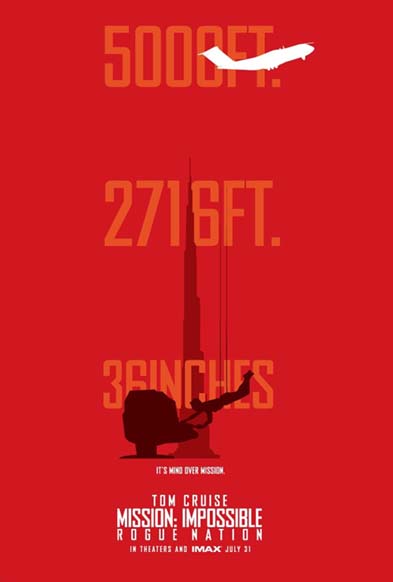 This new poster for Mission: Impossible Rogue Nation appeared today on sites such as imgur, Reddit, and Flickering Myth. The source is said to be Tom Cruise's Twitter page, although I don't see it there... In any case, the poster makes an obvious nod to the first film in the series, which was directed by Brian De Palma.
This new poster for Mission: Impossible Rogue Nation appeared today on sites such as imgur, Reddit, and Flickering Myth. The source is said to be Tom Cruise's Twitter page, although I don't see it there... In any case, the poster makes an obvious nod to the first film in the series, which was directed by Brian De Palma.
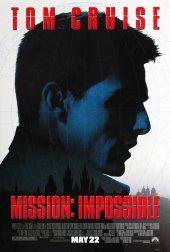 The Now Playing Podcast is looking at each Mission: Impossible film, in anticipation of the fifth film in the franchise, which will open in theaters at the end of July. A couple of weeks ago, they began the series with the initial film from 1996, directed by Brian De Palma. Overall, the group feels that while the film has "problems," they found a lot to like and mildly recommend it. "The problem," according to one of the podcast's three hosts, "is the movie wants to be so coy all the time, it wants to surprise you, that it leaves out too much information, and you end up having to piece things together from not enough footage." If, like me, you don't actually see a problem here, get ready for a trying 84-minute discussion bogged down with comments about how "it would have been easy to fix that" in the script, along with an incessant need to have everything spelled out for the viewer.
The Now Playing Podcast is looking at each Mission: Impossible film, in anticipation of the fifth film in the franchise, which will open in theaters at the end of July. A couple of weeks ago, they began the series with the initial film from 1996, directed by Brian De Palma. Overall, the group feels that while the film has "problems," they found a lot to like and mildly recommend it. "The problem," according to one of the podcast's three hosts, "is the movie wants to be so coy all the time, it wants to surprise you, that it leaves out too much information, and you end up having to piece things together from not enough footage." If, like me, you don't actually see a problem here, get ready for a trying 84-minute discussion bogged down with comments about how "it would have been easy to fix that" in the script, along with an incessant need to have everything spelled out for the viewer.
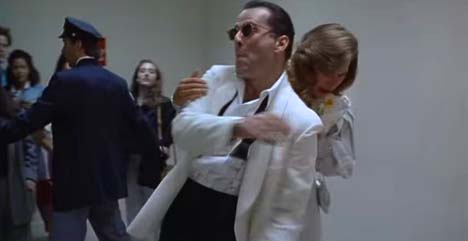
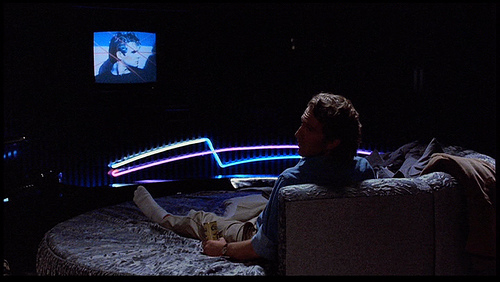 Brian De Palma's Body Double is on the schedule for the Sony Movie Channel this month including a showing Saturday night), while over on MGM-HD, De Palma's Blow Out is programmed throughout this holiday weekend.
Brian De Palma's Body Double is on the schedule for the Sony Movie Channel this month including a showing Saturday night), while over on MGM-HD, De Palma's Blow Out is programmed throughout this holiday weekend."It is difficult to label any one film industry, from its conception to its present day stature, as the greatest of all time. Many, however, would argue that Hollywood has maintained its status as the most extravagant. From the silent spectacles of the roaring twenties to the technicolor marvels of the 1950's, American cinema has always possessed a distinct opulence, a resounding declaration of stature and celebrity. The formula is most commonly associated with Alfred Hitchcock: a leading man, a beautiful woman by his side, and an gaudily enigmatic conflict designed to bewilder audiences far and wide. Thirty years after what most believe to be Hitchcock's golden age, bravura filmmaker Brian De Palma decided to deconstruct this image of Hollywood, and he used the master of suspense himself as the focal point of his refracted image."The narrative presented in Body Double is an intentionally and loudly obvious resurrection of Hitchcock's diagram, albeit a resurrection that has been carefully exaggerated and over-sexualized to deliberately twist a knife in the heart of mainstream cinema's blatant exploitations. Jake Scully is an actor who suffers from a severe case of claustrophobia. He is the symbol of the young American discontent to exist in an ordinary aesthetic where his entrance is lethargically greeted with inaudible applause. He is caustically frustrated by the world's inability to accommodate him and continuously distracted by a pumping libido that facilitates a penchant for peeping. Jake Scully, whose tallest ambition is to achieve Hollywood stardom, is De Palm's leading man, his Carey Grant, so to speak...
"So in the end, once the audience has been captivated and subverted, what does De Palma's steamy, self-reflexive thriller amount to? Is it anti-Hollywood? Post Hollywood? I don't think so. Because despite De Palma's stentorian rancor in his illumination of mainstream cinema's implicit misogyny, much of the material in Body Double exhibits a strong, faithful love of both old and new Hollywood. De Palma adores the chicanery and exorbitance of Hitchcock's narrative. He worships the movement and utilization of the camera. He, like many of us, is a lover of cinema. But he does not idealize it either. He sees Hollywood's faults, cinema's imperfections and absurdities. He wraps them all together, the positives and negatives, and meticulously winds them through the world of this film. Body Double is an American movie about American movies and the Americans who enjoy them. It is a shamelessly ostentatious, visually immaculate, textually capacious masterpiece."
 When the show begins with one of the hosts saying that De Palma's first feature, The Wedding Party, was "such a clunker" he didn't even bother watching it prior to the podcast, and another host says he "took one for the team" in watching it, you wonder why you're even listening to this clunker of a podcast. The team then moves quickly past De Palma's early films, because they are "pretty rough"-- really? Come on, guys, do your homework. Anyway, if you can stick with it past all that, they then begin discussing Sisters (and host Alex Jowski justly insists that De Palma is doing much more than simply aping Hitchcock), Phantom Of The Paradise (which Mister X calls "a glorious train wreck," while Mike White gets passionate, telling the others, "I dig it so much"), Carrie (which is one of Jowski's favorite films of all time-- he wrote about it a couple of months earlier, comparing it with Kimberly Peirce's recent remake), and just about everything up through Body Double. The discussion about Home Movies ("the most awkward" in De Palma's filmography, according to one of the podcast hosts) is typically lazy, even with one noting the very autobiographical nature of the film's plot. Moving on to Dressed To Kill, well, give it a listen and see what you think. They also cover Blow Out (which they loved a lot more than Dressed To Kill) and Scarface. Part 2 should be up later this week.
When the show begins with one of the hosts saying that De Palma's first feature, The Wedding Party, was "such a clunker" he didn't even bother watching it prior to the podcast, and another host says he "took one for the team" in watching it, you wonder why you're even listening to this clunker of a podcast. The team then moves quickly past De Palma's early films, because they are "pretty rough"-- really? Come on, guys, do your homework. Anyway, if you can stick with it past all that, they then begin discussing Sisters (and host Alex Jowski justly insists that De Palma is doing much more than simply aping Hitchcock), Phantom Of The Paradise (which Mister X calls "a glorious train wreck," while Mike White gets passionate, telling the others, "I dig it so much"), Carrie (which is one of Jowski's favorite films of all time-- he wrote about it a couple of months earlier, comparing it with Kimberly Peirce's recent remake), and just about everything up through Body Double. The discussion about Home Movies ("the most awkward" in De Palma's filmography, according to one of the podcast hosts) is typically lazy, even with one noting the very autobiographical nature of the film's plot. Moving on to Dressed To Kill, well, give it a listen and see what you think. They also cover Blow Out (which they loved a lot more than Dressed To Kill) and Scarface. Part 2 should be up later this week.
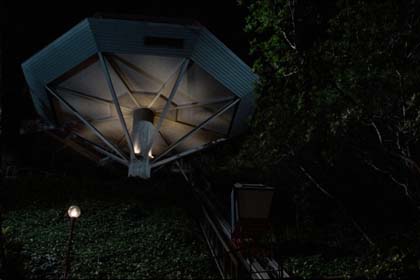 Inspired by the new season of True Detective, Vulture enlisted New York Magazine design expert Wendy Goodman to compile a list of great modernist houses in which Los Angeles villains have taken up residence. (Greg Cwik co-wrote the Vulture article with Goodman.) John Lautner's Chemosphere House, built in 1960, is a prominent setting of Brian De Palma's Body Double, which comes in at number six on the list of eight.
Inspired by the new season of True Detective, Vulture enlisted New York Magazine design expert Wendy Goodman to compile a list of great modernist houses in which Los Angeles villains have taken up residence. (Greg Cwik co-wrote the Vulture article with Goodman.) John Lautner's Chemosphere House, built in 1960, is a prominent setting of Brian De Palma's Body Double, which comes in at number six on the list of eight.
 Los Angeles Times' Robert Abele reviews The Tribe:
Los Angeles Times' Robert Abele reviews The Tribe:"The Tribe is a vortex of filmmaking style and humanity's darker impulses, during which you may find yourself clawing the seat to resist its severe, sometimes exceedingly graphic pull. But denying its power is tough. A former crime reporter, Slaboshpytskiy has made one of the most unusual and disturbing films about criminality of the new century.
"Before the first image appears, the movie warns you of its gimmick: The characters all communicate in sign language, with no subtitling or narration. As raw as that deal may seem between an ambitious director and foreign-film audiences normally unfazed by language barriers, Slaboshpytskiy uses it to free up his visual storytelling and direction of actors, which is nearly always illuminative.
"It also fosters an abiding appreciation for the gesticulative art of the all-deaf performers, whose interactions — whatever the emotion at hand — have the expressiveness of choreography. Be assured, there's no lack of narrative clarity here, only the persistent sense that nothing cheerful is in store...
"The Tribe is marked not just by wordlessness — the ambient sound makes it not truly silent — but by Slaboshpytskiy's mesmerizing long takes. Each one is a mini-drama of movement, suspense and revelation, whether tracking characters around the rooms, hallways and grounds of the school, or parked in one spot for a scene of mischief, conversation, explicit sex, or, late in the film, an excruciating real-time abortion. It's shooting style, patient yet predatory, that feels one part Eastern European directors' penchant for protractedly gloomy tableaux, one part Brian De Palma in voyeur mode, with a dash of Martin Scorsese articulating the kinetics of gangster life.
"The film is made up of only 34 shots — fewer cuts than Michael Bay would use to film a commercial. But stitched together, the effect is bracingly alchemic in connecting us to a corrosive world, and characters for whom the mobility of sight is everything. Few first films have so confidently executed such a formalist approach to visuals and communication."
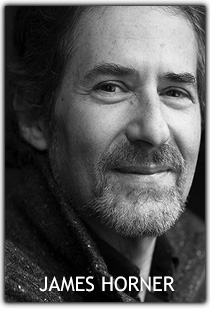 The film world was rocked by tragedy late last night when it was reported that James Horner, Oscar-winning composer of the scores for Titanic, Braveheart, and many other films, died in a plane crash in California. He was 61. According to The Hollywood Reporter's Mike Barnes, "Horner was piloting the small aircraft when it crashed into a remote area about 60 miles north of Santa Barbara, officials said."
The film world was rocked by tragedy late last night when it was reported that James Horner, Oscar-winning composer of the scores for Titanic, Braveheart, and many other films, died in a plane crash in California. He was 61. According to The Hollywood Reporter's Mike Barnes, "Horner was piloting the small aircraft when it crashed into a remote area about 60 miles north of Santa Barbara, officials said."